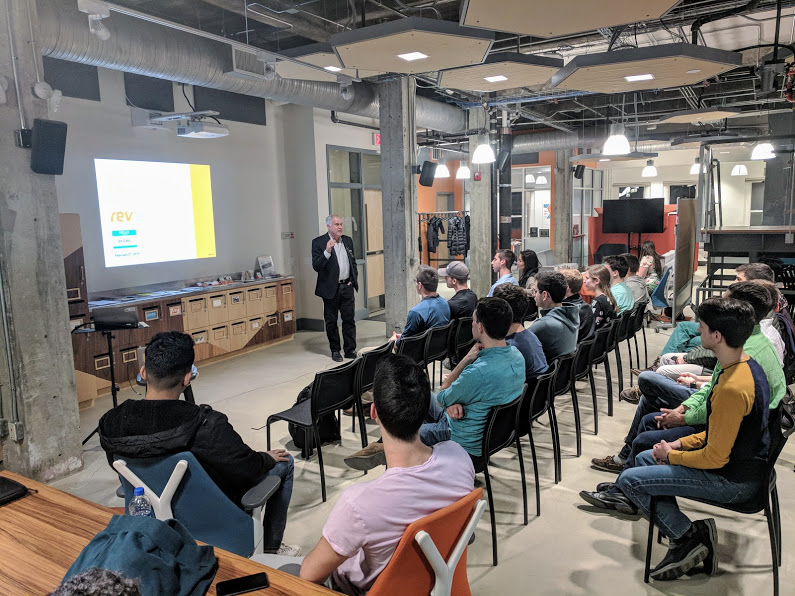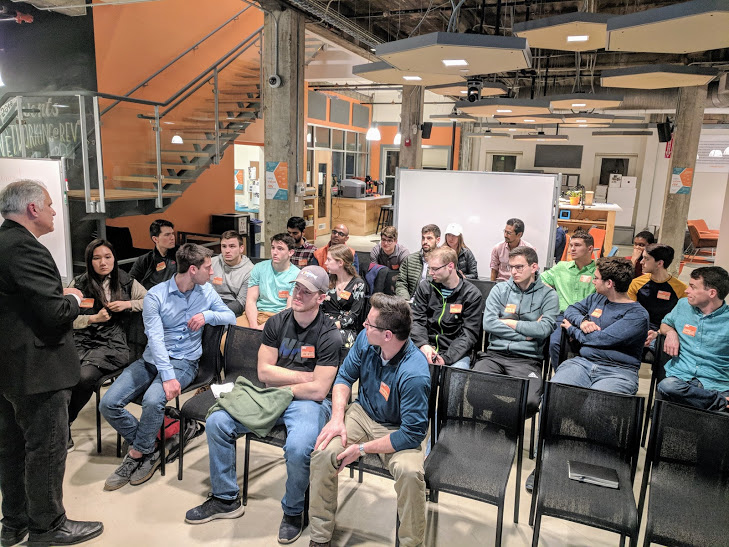
Cornell Alum Ed Catto ’84 Shares Tips for Succeeding at Trade Shows
Rev: Ithaca Startup Works hosted Cornell alum Ed Catto ’84 on February 27 for a talk entitled “Boothmanship: An Entrepreneur’s Guide to Getting the Most Out of Tradeshows.” Dozens of students and entrepreneurs from around the area gathered to hear Catto, the co-founder of Bonfire Agency, a full-service branding and marketing firm, share insights gleaned from his extensive experience working the trade show circuit during his professional career. That experience includes a senior position with Reed Exhibitions, a global leader in conferences and business events.
Catto began his talk by underscoring the massive opportunity represented by trade shows, which often bring together hundreds, if not thousands, of key people from within a single industry. Catto divided his talk into three sections, providing recommendations for steps entrepreneurs should take before, during, and after the trade show.
Pre-Event Preparation is the Key to Success
According to Catto, the work of succeeding at a trade show begins well before the event takes place. “Have a strategy before the show,” he relayed, “and hold yourself accountable to it afterwards.” The first thing an entrepreneur should do is set goals. Entrepreneurs should have a clear sense of why they’ve chosen a particular event, and what they hope to accomplish by attending, be it to sell a product, network, advertise or conduct market research. Once they’ve defined their goals, entrepreneurs should get to work booking meetings—the more the better. Attendees shouldn’t be afraid to overbook, noted Catto, since they can always make strategic changes to their schedules once the event is underway. “Trade shows are sloppy,” he said. “It’s important to be constantly evaluating.”


If they intend to make sales at the trade show, entrepreneurs should also have a clear sense of how they’ll need to perform in order to hit their targets. That means calculating the number of pitch opportunities they are likely to have over the course of the event, and what their conversion rate will have to be to meet their revenue objectives. “It involves simple calculations,” Catto said. “But’s it’s amazing how many people don’t do them.”
During the Event: Be Strategic and Flexible
Once the trade show has started, Catto highlighted several practical things to keep in mind. The first was that initial impressions matter. Entrepreneurs should should have a strong, concise pitch ready at all times, so that they can stand out amid the madness and frothiness of a trade show. In order to remain flexible, Catto recommended that entrepreneurs huddle with their colleagues (assuming they’re not alone) every morning to plot out a daily schedule. And even if they are primarily focused on making sales, entrepreneurs shouldn’t neglect taking the time to meet with existing customers. “Trade shows are a great place to reinforce existing relationships,” he said.
Entrepreneurs should also try to learn new things each day and be mindful about using their time efficiently. If an entrepreneur senses that a conversation isn’t leading them anywhere, they shouldn’t hesitate to politely move on. Finally, Catto shared that trade show attendees should maintain a keen eye for where the action is taking place. Often, more deals are made at the hotel bar than on the event floor itself, Catto said. Finally, don’t forget to wear comfortable shoes! People do a lot of standing at trade shows, Catto, acknowledged—it’s important to dress for the occasion.


Afterwards: Follow-Up Quickly and Memorably
Once the event is over, entrepreneurs should immediately begin the process of capitalizing on their new connections. “A stack of business cards does you no good if you don’t follow up,” Catto emphasized. Entrepreneurs should follow up quickly and memorably, in a way that will facilitate an ongoing relationship. They should also be open to sharing their experience. That could mean passing on new knowledge to their colleagues, or writing about the trade show online, whether for their company web site or on LinkedIn.
Catto has remained close to Cornell since graduating in 1984 by guest lecturing at the business school. Having recently moved back to the Finger Lakes Region from New York City, he said beforehand that the talk was a great opportunity to strengthen his connection to the growing entrepreneurial ecosystem in the Southern Tier.
“Upstate New York is a place of great potential and opportunity, stretching from Buffalo to Binghamton to Albany and beyond,” he said. “It’s really encouraging and exciting to see.”
